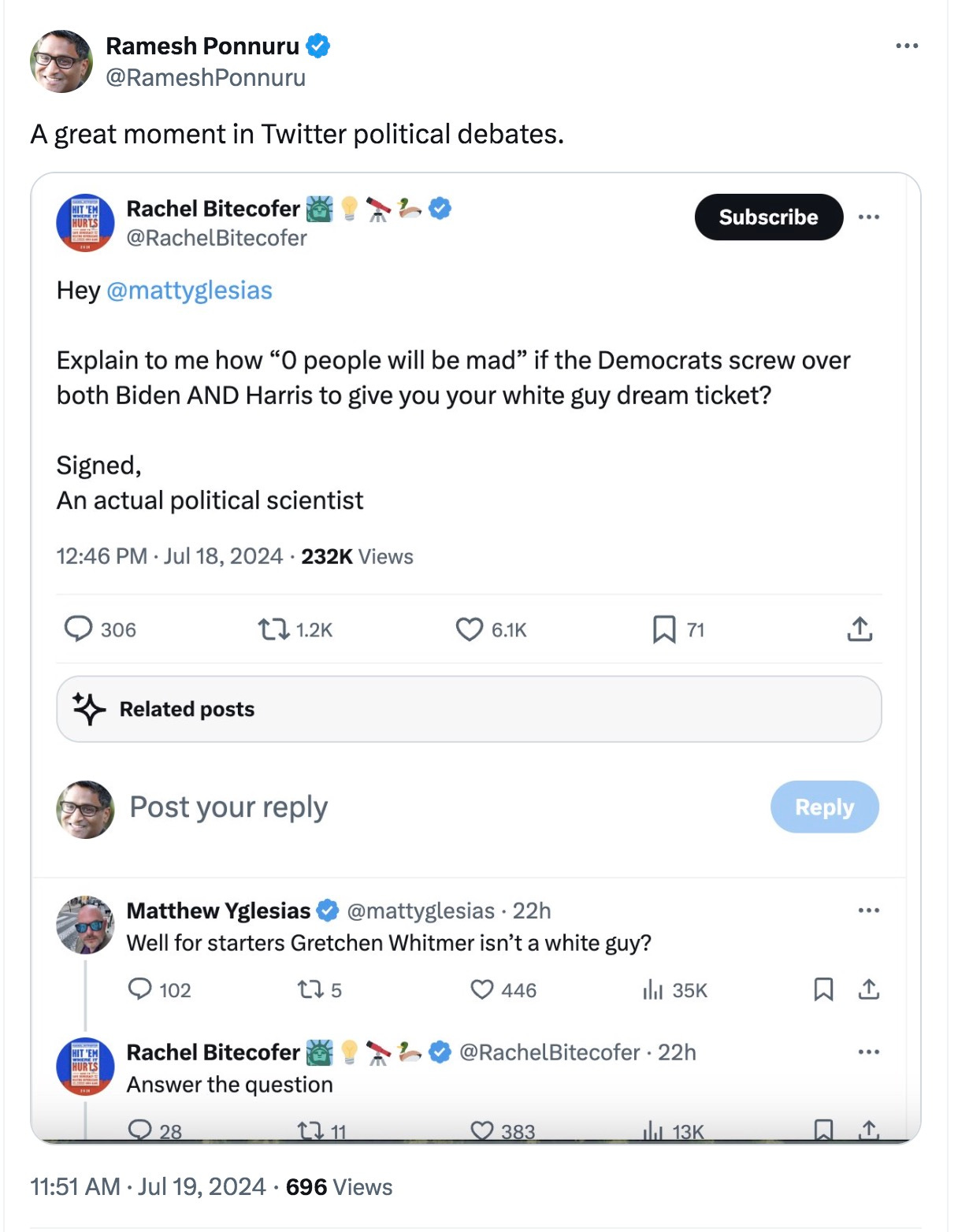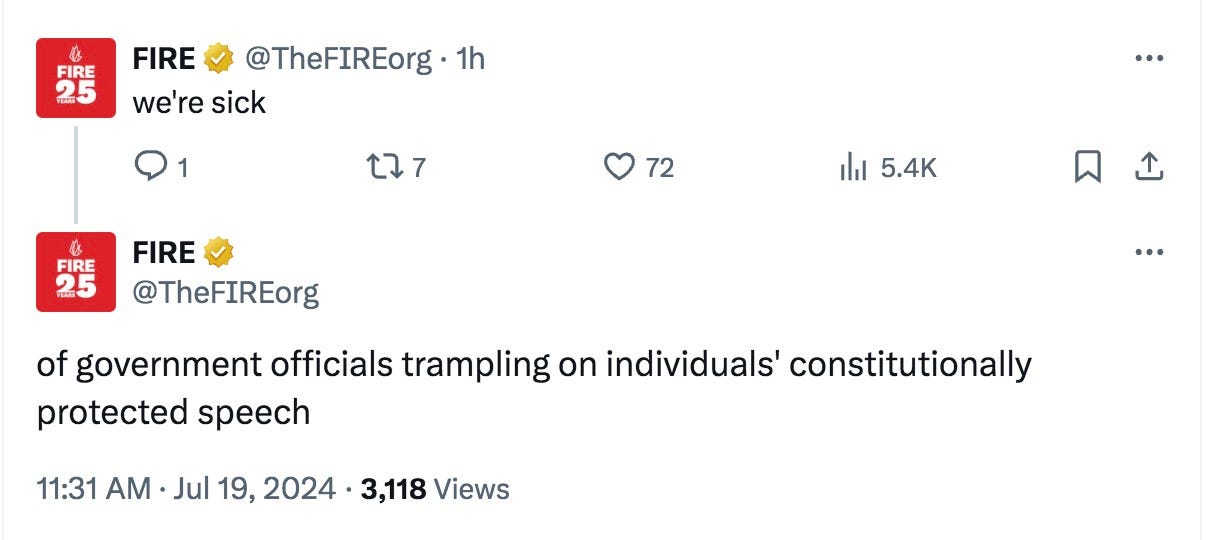E-Pluribus | July 19, 2024
JD Vance and the Mamaw State; cancel culture losing steam; and if we can't just all get along, can we at least talk?
A round-up of the latest and best musings on the rise of illiberalism in the public discourse:
Kevin D. Williamson: Government Isn’t Your Mamaw
Newly crowned Republican vice presidential candidate JD Vance burst onto the national stage less than a decade ago in 2016 with his gritty memoir Hillbilly Elegy. Based on his speech at the convention, however, says Kevin Williamson at The Dispatch, Vance is trying to get too much mileage out of Mamaw to chart America’s future under a Trump-Vance presidency.
America is a funny old place. Not many people know J.D. Vance’s grandmother, the person. A lot of them know Mamaw the literary character, and a whole lot more know Mamaw the movie character, played by Glenn Close. In his convention speech, vice presidential nominee Vance credited his success in life to his Mamaw. That was smart: J.D. is about the fourth-most-interesting character in Hillbilly Elegy, and Mamaw is the crowd-pleaser. As the noted philosopher Darrell Royal once said, “You’ve gotta dance with them what brung ya.”
There is a problem with Vance’s odd political and social position. He wants to talk about how America doesn’t work, but he personifies how beautifully it does work. One of the things America is awfully good at is locating bright, intellectually inclined young people in modest circumstances and helping them along. Terrible, dysfunctional families can make that a lot harder—I know whereof I write—but three cheers for our institutions of higher education and our ruthlessly efficient labor market.
[. . .]
Vance had a grandmother who encouraged him—and, perhaps equally important, discouraged him—in the right ways.
[. . .]
It is good to have a Mamaw. I could have used one myself. I was lucky to grow up in a college town, which meant that I had friends with parents who were professors and other educated professionals, who gave me some of the direction I did not get at home. But Vance isn’t running for Papaw. He is running for vice president, the No. 2 executive officer of the U.S. government, the job of which is entirely different from the job of Mamaw, worthy as the latter profession may be. What troubled Vance’s family was not a poor economy or lack of economic opportunity—as I noted in my review, his supposedly hardscrabble family had a household income in excess of $100,000 a year, at times—and it was not public policy, either. He was raised by low and incompetent people, who, like the poor, we will always have with us. What young J.D. needed most were things that the state cannot provide.
Read it all.
Geoff Shullenberger: How cancel culture lost its power
Cancel culture ain’t what it used to be, writes Geoff Shullenberger at UnHerd, and maybe it never was. Shullenberger argues other factors are at play that undermine how effective cancel culture has been at enforcing supposed norms.
On July 16, three days after the assassination attempt on Donald Trump, the founder of the Right-wing X account “Libs of Tiktok” announced she was dedicating “ALL OF LIBS OF TIKTOK’S RESOURCES” toward “EXPOSING the Radical Left fantasizing about killing President Trump”. At issue were social media posts in the aftermath of the shooting in which people said things like “shame he missed” and “a little to the right next time”. Because of her efforts, Raichik boasted, “TEN DERANGED LEFTISTS have already been FIRED from their jobs.” Those targeted included a realtor, a physical therapist, several nurses and schoolteachers, and a Home Depot cashier.
This scorched-earth campaign has met with a mixed reception. Some have made the obvious point that getting random people fired for intemperate posts is what Raichik’s Right-wing milieu has long denounced as “cancel culture”; others were celebratory.
[. . .]
Right-wing supporters of tactics such as Raichik’s don’t seem to agree on what is meant to be achieved by them. While some admit they are mainly interested in revenge, others have claimed a détente could be achieved in the culture war through “mutually assured destruction”. The thinking seems to be that if Leftists fear that culture will come for their own, they will think twice about deploying such tactics against the Right. We might think of this as a pursuit of classically liberal ends — the protection of viewpoint diversity and free speech — by illiberal means. For others, conversely, the objective seems to be to forge a new cultural consensus in which Left-wing views are suppressed through stigma.
Regardless, the assumption appears to be that the Left’s pursuit of cancellation has been effective at enforcing its norms, ergo the Right should follow suit — whether to achieve equilibrium or total cultural dominance. But there remains a question: has cancel culture really been a boon to Left-wing dominance?
[. . .]
The rise of cancel culture [. . .] was not some strategic Left-wing scheme to achieve ideological hegemony, but the chaotic emergence of social dynamics in a new media landscape. The norms enforced in the early cases just discussed — disapproval of racist jokes and disrespect for fallen soldiers — predated this development. Social media had incited the violation of these norms as a means of accumulating the currency of attention, but also created chaotic new mechanisms for policing such violations by exposing them to a broader public that could be easily galvanised into a virtual mob.
[. . .]
If cancel culture were ever effective at enforcing a given set of norms, there is reason to think this efficacy has been on the wane. We have also seen a disaggregation and re-fragmentation into new platforms, meaning that becoming the main character of the entire internet for a day, as Sacco did, is now nearly impossible, and so is enforcing the same set of norms across the digital public sphere. Aided by this development, many ostensibly cancelled figures have reemerged unscathed and often very successful.
Read it all here.
Erin Norman & Lura Forcum: Beyond Polarization: How Americans Can Talk About Politics Again
If we can learn how to talk about politics again, maybe religion is next! Writing for Real Clear Politics, Erin Norman & Lura Forcum argue Americans are not as divided as it appears, and that extremists on both sides are making it more difficult for average citizens to work out their differences and arrive at true policy solutions, reaching the kind of compromise that always has been (and always will be) part and parcel of a pluralistic society.
We can and must bring non-extremists back to politics, and that means understanding good-faith Americans even better. The State Policy Network (SPN) conducted research on voters’ values as a way of better identifying how people might connect with conversations about public policy, since a divisive political framework isn’t cutting it. By understanding what is important to voters based on fundamental human concerns – such as having adequate resources, belonging to a community, and understanding what constitutes right and wrong – we can determine the best ways to bring them into a conversation about policy.
[. . .]
By and large, Americans aren’t driven by politics; they are primarily driven by other, more profound motivations, and that is good news in our current climate.
Even better, a vast majority of Americans (76%) respect differing opinions, and over half co-exist peacefully with those holding opposing political views. Seventy-six percent of Americans similarly favor leaders who are honest and play by the rules, and it is crucial for such non-extremism to dominate our discourse.
Which brings us back to “how we talk”: Americans should talk to others about what their needs actually are, and how policy can meet those needs. When someone tells you they support a policy you disagree with, ask them to tell you why they support it instead of telling them why they shouldn’t. Look for areas of agreement on what the problems are, even if you disagree on the path forward.
It’s not that we need to agree with one another. Disagreement, when civil, is a way we can learn about others’ points of view and realize that there’s more than one lens through which to view a problem. The more points of view we can bring to a policy conversation, the more likely we are to arrive at effective policy that is embraced by the nation as a whole. Complex problems, like the ones faced by our nation, require as much knowledge and perspective as we can get in order to design real solutions.
Read the whole thing.
Around Twitter (X)
Via Ramesh Ponnuru, one for the Great Moments in Twitter collection:
When Joe Biden contracted COVID, his campaign decided to take advantage of it on social media. The Foundation for Individual Rights and Expression saw their “sick” tweet and raised them:
And finally, if this were The Onion instead of The Washington Post, it would still be offensive, but at least it would have the excuse of being The Onion:










